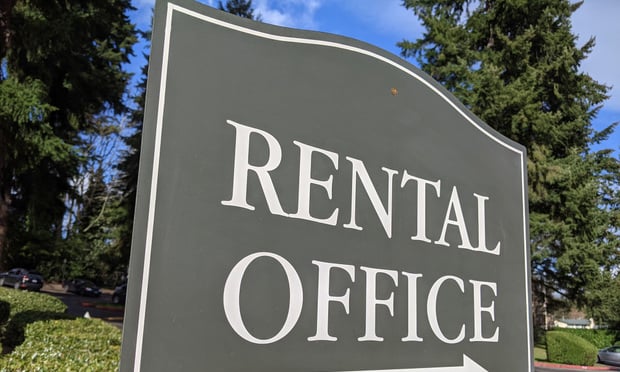
The new tax plans that have passed in the House and Senate could impact housing demand and construction. To find out more, we sat down with Andrew Starrels, a partner at Holland & Knight LLP, for an exclusive interview. Here, we ask how the plan could impact home construction, deductions taken by investors and his advice to investors.
GlobeSt.com: How could the federal tax plan affect Los Angeles home construction?
Andrew Starrels: There are several issues packed into this question. First, it's important to remember that for many taxpayers, the mortgage interest deduction for federal income tax purposes has been a vitally important tax planning strategy for generations, and has been a determinative factor in individual decisions to purchase a home. This is especially important in California, where property values are higher than in other parts of the country, and homeowners have significant amounts of their personal wealth committed to their residences. Both the bills approved by the House and the Senate will reduce the amount of deductibility for mortgage interest, and to the extent that the new tax scheme removes incentives for home ownership, it will affect housing affordability and potentially drag down home construction. The homebuilding industry has been lobbying to retain the deductibility of mortgage interest because of the potential that reducing deductions can have on housing demand, and the issue potentially affects first-time buyers as well as owners looking to “trade up.” To the extent that this reduces demand for new home construction in and around Los Angeles, that will have an dampening effect on housing construction and on well-paying construction jobs. I should also note that the overall impact of the tax bill on after-tax income, because of the removal of other deductions, could also affect housing demand and in turn home construction.
GlobeSt.com: The tax plan will also affect deductions taken in income taxes. Why is this a concern for real estate investors?
Starrels: It is apparent that, regardless of the manner in which, the Senate and House tax bills are reconciled, many Californians will find fewer deductions available to them, and will lose more of their disposable income to taxes. Both the House and Senate bills eliminate the deductibility of state income taxes for federal income tax purposes, and both place limits on the deductibility of local property taxes. In a high-tax state such as California, this represents a high value deduction for many taxpayers, which will leave residents with less income to spend toward housing, and could discourage home purchases and depress home prices. Most real estate investors are wary of making substantial real estate investments when consumer spending is depressed, so to the extent that the tax bill leaves California taxpayers with less to spend, that could impair real estate investment, and we could see reductions in market rental rates for rental housing and increased vacancies. To be fair, there are many other factors indicating continued strength of the California real estate market,
GlobeSt.com: Now that the tax plan has passed, how do you expect it to impact real estate activity next year?
Starrels: To clarify, the tax reform effort is not finished. The House and the Senate have both passed tax bills, but there are significant differences between them. The legislative process long established in the federal government now requires each branch to reconcile its respective bill through a conference committee process, with one compromise bill then submitted to each of the House and Senate for approval before it can go to the President for signature.
The bills approved by the House and Senate contain several provisions, as I've described, that could constrain housing affordability and slow down home construction. But there are some factors that could contribute to strong continued real estate activity. Interest rates remain relatively low, and construction debt is still available. In prior recessionary periods, real estate activity did not slow until at least one of those factors was absent. Moreover, if home ownership becomes harder to obtain, demand for rental housing should increase, and the multifamily market remains quite strong with very low vacancy and extreme undersupply. So in the near term, I would expect there still to be a lot of activity in some sectors of real estate.
That being said, some aspects of the proposed tax bills still raise real estate concerns. To begin with, the House bill eliminates private activity bonds (the Senate version retains them). In a nutshell, these mechanisms allow the financing of affordable housing, infrastructure projects and institutional developments for things like museums, private educational facilities, and transportation improvements through the issuance of tax exempt bonds. Without these programs, the financing of these developments will become more expensive, and this type of development activity might slow down. Private activity bonds have historically been a popular financing vehicle for “mixed-income” or “80/20” housing developments, in which specified percentages of new housing units in a development are set aside for low income residents. Mixed-income projects have been responsible for the creation of a significant percentage of the affordable housing units built in Southern California over the past 30 years, and if those financing programs are eliminated or curtailed, it will threaten Los Angeles' and other communities' efforts to address the severe shortage of affordable housing within their constituencies. In a separate part of the legislation, the House bill eliminates the Historic Preservation Tax Credit, which has been a major incentive for adaptive reuse and rehabilitation projects involving historic properties in neighborhoods such as Downtown Los Angeles, Hollywood and other areas. Both versions of the tax bill do preserve the Low Income Housing Tax Credit, which is a major driver of affordable housing development, but would potentially limit the availability of these credits.
GlobeSt.com: What is your advice to investors concerned about the impact of the tax plan?
Starrels: First and foremost, I am not offering investment, tax or legal advice to anyone reading this with respect to any specific set of circumstances, and would always recommend that investors consult with their own professional advisors. I would say, though, that as a general matter, the orchestrations of tax reform now going on in Washington require patience. We still don't know what form the tax legislation will take if it is successfully compromised and presented to the President. Most experts supporting the plan point to the significant reductions in tax rates on corporate income and the preservation of real estate-friendly provisions like the “carried interest” as indications that real estate investment activity will continue at close to its current pace, especially in light of California's severely unmet demand for housing and resulting high real estate prices. Beyond the question of commercial real estate investment, the new tax policy does threaten to reduce after-tax spending ability for consumers in California and other high-tax states, and those forces will impact homeownership, luxury good purchases and other non-necessities, as well as continue the disparity between wealth and need throughout California.
Want to continue reading?
Become a Free ALM Digital Reader.
Once you are an ALM Digital Member, you’ll receive:
- Breaking commercial real estate news and analysis, on-site and via our newsletters and custom alerts
- Educational webcasts, white papers, and ebooks from industry thought leaders
- Critical coverage of the property casualty insurance and financial advisory markets on our other ALM sites, PropertyCasualty360 and ThinkAdvisor
Already have an account? Sign In Now
*May exclude premium content© 2025 ALM Global, LLC, All Rights Reserved. Request academic re-use from www.copyright.com. All other uses, submit a request to [email protected]. For more information visit Asset & Logo Licensing.








